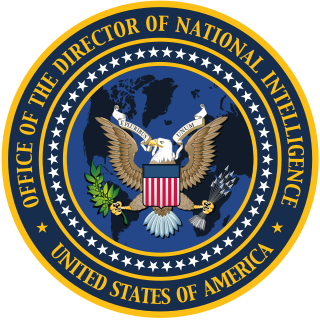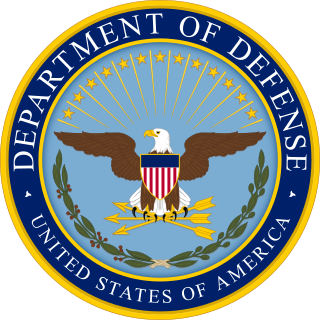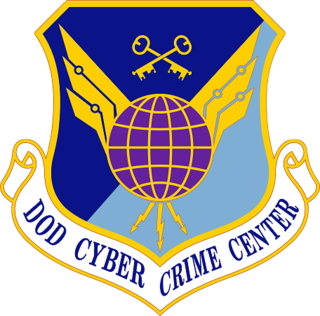Open-source intelligence (OSINT) is the collection and analysis of data gathered from open sources to produce actionable intelligence. OSINT is primarily used in national security, law enforcement, and business intelligence functions and is of value to analysts who use non-sensitive intelligence in answering classified, unclassified, or proprietary intelligence requirements across the previous intelligence disciplines.

The director of national intelligence (DNI) is a senior, cabinet-level United States government official, required by the Intelligence Reform and Terrorism Prevention Act of 2004 to serve as executive head of the United States Intelligence Community (IC) and to direct and oversee the National Intelligence Program (NIP). All IC agencies report directly to the DNI. The DNI also serves, upon invitation, as an advisor to the president of the United States, the National Security Council and the Homeland Security Council on all intelligence matters. The DNI, supported by the Office of the Director of National Intelligence (ODNI), produces the President's Daily Brief (PDB), a classified document including intelligence from all IC agencies, handed each morning to the president of the United States.

The United States Intelligence Community (IC) is a group of separate United States government intelligence agencies and subordinate organizations that work both separately and collectively to conduct intelligence activities which support the foreign policy and national security interests of the United States. Member organizations of the IC include intelligence agencies, military intelligence, and civilian intelligence and analysis offices within federal executive departments.

The Central Security Service (CSS) is a combat support agency of the United States Department of Defense which was established in 1972 to integrate the National Security Agency (NSA) and the Service Cryptologic Components (SCC) of the United States Armed Forces in the field of signals intelligence, cryptology, and information assurance at the tactical level. In 2002, the CSS had approximately 25,000 uniformed members. It is part of the United States Intelligence Community.

The Bureau of Intelligence and Research (INR) is an intelligence agency in the United States Department of State. Its central mission is to provide all-source intelligence and analysis in support of U.S. diplomacy and foreign policy. INR is the oldest civilian element of the U.S. Intelligence Community and among the smallest, with roughly 300 personnel. Though lacking the resources and technology of other U.S. intelligence agencies, it is "one of the most highly regarded" for the quality of its work.

The United States Naval Criminal Investigative Service (NCIS) is the primary investigative law enforcement agency of the U.S. Department of the Navy. Its primary function is to investigate major criminal activities involving the Navy and Marine Corps, though its broad mandate includes national security, counterintelligence, counterterrorism, cyberwarfare, and the protection of U.S. naval assets worldwide. NCIS is the successor organization to the former Naval Investigative Service (NIS), which was established by the Office of Naval Intelligence after the Second World War.

The Directorate of Operations (DO), less formally called the Clandestine Service, is a component of the US Central Intelligence Agency. It was known as the Directorate of Plans from 1951 to 1973; as the Directorate of Operations from 1973 to 2005; and as the National Clandestine Service (NCS) from 2005 to 2015.

The United States under secretary of defense for policy (USDP) is a high level civilian official in the United States Department of Defense. The under secretary of defense for policy is the principal staff assistant and adviser to both the secretary of defense and the deputy secretary of defense for all matters concerning the formation of national security and defense policy.
The Australian Intelligence Community (AIC) and the National Intelligence Community (NIC) or National Security Community of the Australian Government are the collectives of statutory intelligence agencies, policy departments, and other government agencies concerned with protecting and advancing the national security and national interests of the Commonwealth of Australia. The intelligence and security agencies of the Australian Government have evolved since the Second World War and the Cold War and saw transformation and expansion during the Global War on Terrorism with military deployments in Afghanistan, Iraq and against ISIS in Syria. Key international and national security issues for the Australian Intelligence Community include terrorism and violent extremism, cybersecurity, transnational crime, the rise of China, and Pacific regional security.
The National Intelligence Board (NIB), formerly the National Foreign Intelligence Board and before that the United States Intelligence Board is a body of senior U.S. Intelligence Community leaders currently led by the Director of National Intelligence (DNI). The Board is tasked with reviewing and approving National Intelligence Estimates (NIEs).

The Office of Intelligence and Analysis (OIA) is a component of the United States Department of the Treasury responsible for the receipt, analysis, collation, and dissemination of foreign intelligence and counterintelligence information related to the operation and responsibilities of the Treasury Department.
In the United States, fusion centers are designed to promote information sharing at the federal level between agencies such as the Federal Bureau of Investigation, the U.S. Department of Homeland Security, the U.S. Department of Justice, and state, local, and tribal law enforcement. As of February 2018, the U.S. Department of Homeland Security recognized 79 fusion centers. Fusion centers may also be affiliated with an emergency operations center that responds in the event of a disaster.

The under secretary of defense for intelligence and security or USD(I&S) is a high-ranking civilian position in the Office of the Secretary of Defense (OSD) within the U.S. Department of Defense (DoD) that acts as the principal civilian advisor and deputy to the secretary of defense (SecDef) and deputy secretary of defense (DepSecDef) on matters relating to military intelligence and security. The under secretary is appointed as a civilian by the president and confirmed by the Senate to serve at the pleasure of the president.

The United States government's Information Sharing and Customer Outreach office or ISCO was one of five directorates within the office of the chief information officer (CIO) under the Office of the Director of National Intelligence (ODNI). ISCO changed its name and function to Information Technology Policy, Plans, and Requirements (ITPR) in July 2007. Established by at least February 2006, ISCO is led by the Deputy Associate Director of National Intelligence for Information Sharing and Customer Outreach, which is currently Mr. Richard A. Russell. ISCO's information sharing and customer outreach responsibilities extend beyond the United States Intelligence Community and cross the entire U.S. government.

The Department of Defense Cyber Crime Center (DC3) is designated as a Federal Cyber Center by National Security Presidential Directive 54/Homeland Security Presidential Directive 23, as a Department of Defense (DoD) Center Of Excellence for Digital and Multimedia (D/MM) forensics by DoD Directive 5505.13E, and serves as the operational focal point for the Defense Industrial Base (DIB) Cybersecurity program. DC3 operates as a Field Operating Agency (FOA) under the Inspector General of the Department of the Air Force.

In the United States the Associate Director of National Intelligence and Chief Information Officer is charged with directing and managing activities relating to information technology for the Intelligence Community (IC) and the Office of the Director of National Intelligence (ODNI). The IC CIO reports directly to the Director of National Intelligence (DNI). As of January 24, 2022, Dr. Adele Merritt has assumed duties as the IC Chief Information Officer.
The Boren-McCurdy intelligence reform proposals were two legislative proposals from Senator David Boren and Representative Dave McCurdy in 1992. Both pieces of legislation proposed the creation of a National Intelligence Director. Neither bill passed into law.
The US Department of Commerce Office of Security is a division of the United States Department of Commerce (DOC) that works to provide security services for facilities of the department. Its aim is to provide policies, programs, and oversight as it collaborates with facility managers to mitigate terrorism risks to DOC personnel and facilities, program managers to mitigate espionage risks to DOC personnel, information, and facilities, and Department and Bureau leadership to increase emergency preparedness for DOC operations.

Dawn Eilenberger became the Deputy Director of National Intelligence in April 2017. Previously she was the Assistant Director of National Intelligence for Policy & Strategy, Office of the Director of National Intelligence (ODNI). In this role, she oversees the formulation and implementation of Intelligence community (IC)-wide policy and strategy on the full range of intelligence issues, including collection, analysis, requirements, management and information sharing, and provides leadership for ODNI and IC initiatives on information sharing and the closure and disposition of detainees at the Guantanamo Bay detention camp.

The National Open Source-Intelligence Agency (NOSA) is a proposed 19th member of the United States Intelligence Community (IC) to be tasked with the collection and exploitation of open-source intelligence (OSINT). Creation of the agency would consolidate open source efforts from across the US government into a new functional manager for the open-source intelligence discipline, drawing resources from the Open Source Enterprise of the Central Intelligence Agency, the Open Source Integration Center (OSIC) of the Defense Intelligence Agency, the National Geospatial-Intelligence Agency, as well as other open source focused entities across the government.










